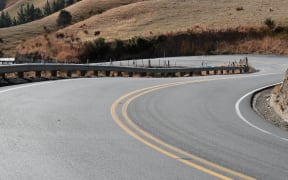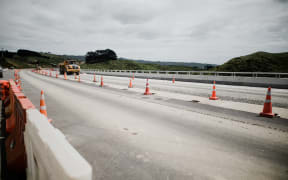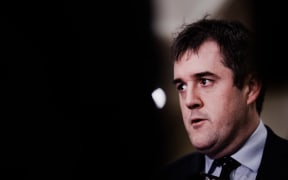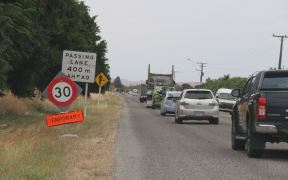A half-a-billion-dollar pothole in road funding has been patched over but key projects remain in jeopardy.
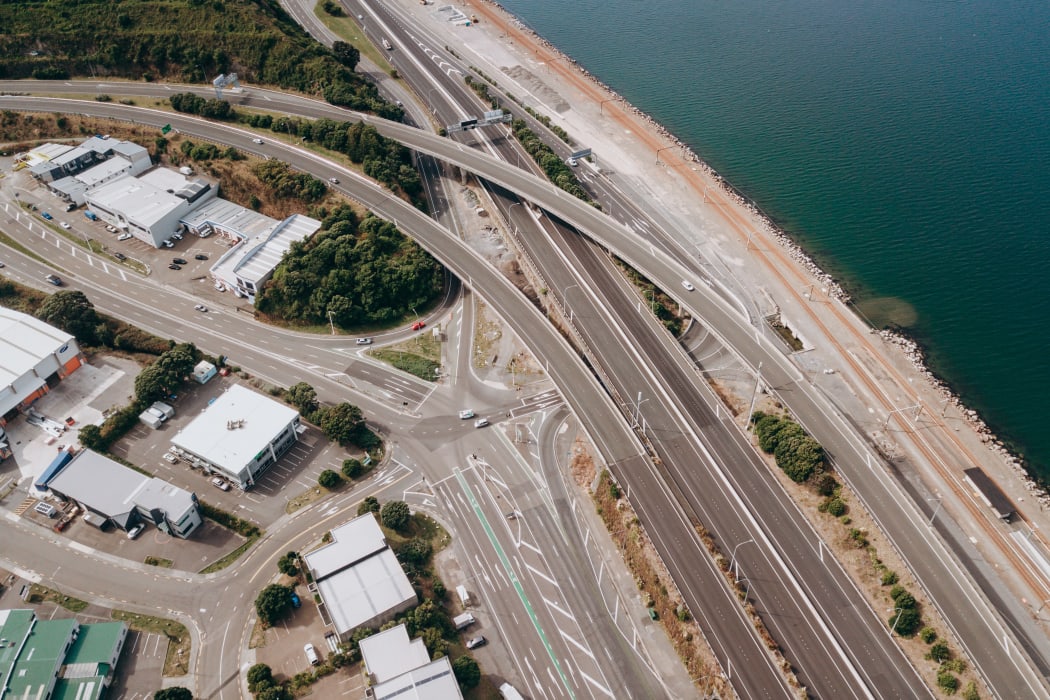
File photo of SH1 & SH2 Ngauranga Interchange. Photo: RNZ / Dom Thomas
Money is especially scarce for State Highway improvements, public transport infrastructure and the government's flagship safety strategy Road to Zero.
This has come at a crucial time when the country's transport plans for the next three years are being drawn up, and as the Transport Agency (NZTA) tries to find new revenue sources amid a funding review.
Western Bay of Plenty mayor Garry Webber spent yesterday morning in a meeting of the Western Bay of Plenty's roading committee. He emerged newly doused in exasperation.
"Our frustrations are at bursting point," he said.
"We just keep on getting kicked to the back of the queue. And this is regardless of which political party has been in play."
The rural town has fought for 30 years for a bypass to get big trucks off the main road that does dangerous double duty as the State Highway link to the Port of Tauranga.
"Like all things, that will go into the concrete mixer, and I wouldn't be at all surprised if it comes out the back end, 'Sorry, hear your frustrations. But there is no money'," Webber said.
"It's almost a charade. Every three years we have to go through this process of doing a hell of a lot of, you know, executive and councillor time working out what our priorities are.
"And as I said this morning, the 2004 document, the 2007 document, nothing's changed."
These meetings are taking place throughout the country, as council regional transport committees work on regional land transport plans to add to NZTA's national plan.
But they are working under an even darker cloud than usual.
The Transport Agency, its revenues hit by Covid-19, has warned there was "very limited funding" and "very little room".
Already 90 percent of revenue until 2024 was committed to existing projects or just to keep the wheels turning.
"This leaves very little room for project-related spend above the bottom of the activity class [for] State Highway Improvements, Road to Zero, Public Transport Infrastructure, Rail and Coastal Shipping)," Waka Kotahi told councils.
Planning could be a road to nowhere; as Stuart Crosby, head of Local Government New Zealand, puts it: "We know, at this point in time, that many projects will not get over the line.
"Particularly in the State Highway area in the growth areas in particular," Crosby said.
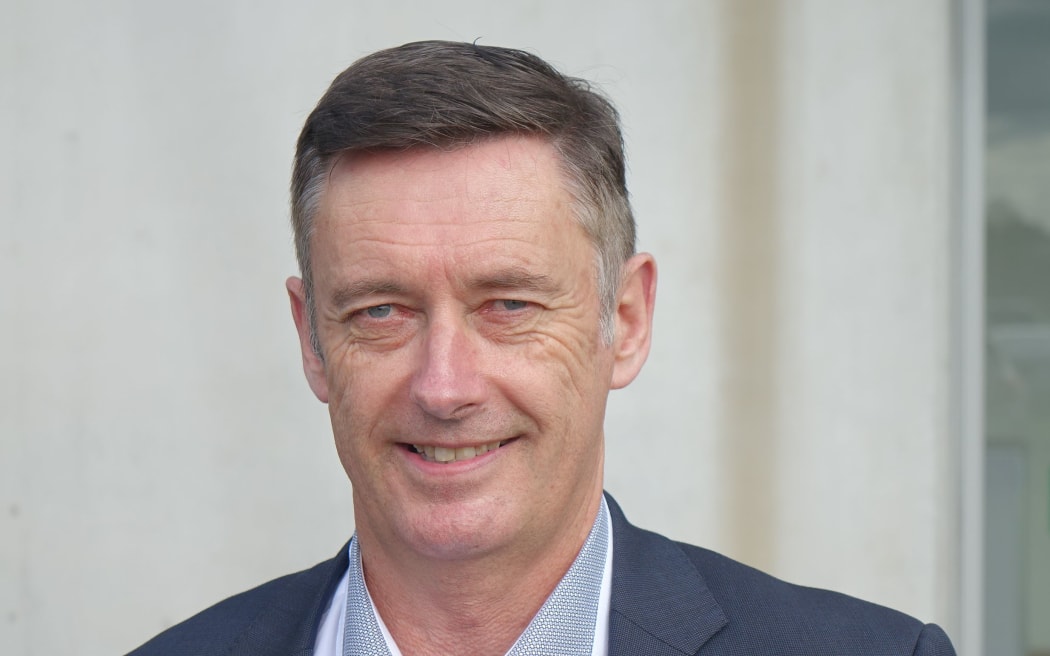
Stuart Crosby, head of Local Government New Zealand Photo: RNZ/ Andrew McRae
NZTA is expecting more will be spent on highway and local road maintenance, and on public transport services - as opposed to infrastructure.
However, that in part is just playing catch-up from recent underspending: By 3 percent and 7 percent respectively on highway and local road maintenance in 2019-20, accompanied by a 30 percent underspend on cycling and walking, with many projects suffering from Covid disruption among other things.
'A very difficult situation'
Things had looked worse still in February, when NZTA warned councils it faced "a very difficult situation", and would start the three-year period $250m in the red.
It also faced a $500 million hole just meeting bare minimum demands.
Local Government New Zealand responded to that with a policy note telling councils that maintenance and public transport faced an "acute funding crunch".
It said it had been raising the alert since mid-2020 about the pressures building on councils to meet their share of the three-year-plan costs (typically 50 percent on local roads).
The $500m hole now appears to have been plugged, from NZTA revenues rising to $13.5 billion from $13 billion.
"And the forecasts may continue to improve," an upbeat Transport Minister Michael Wood said.
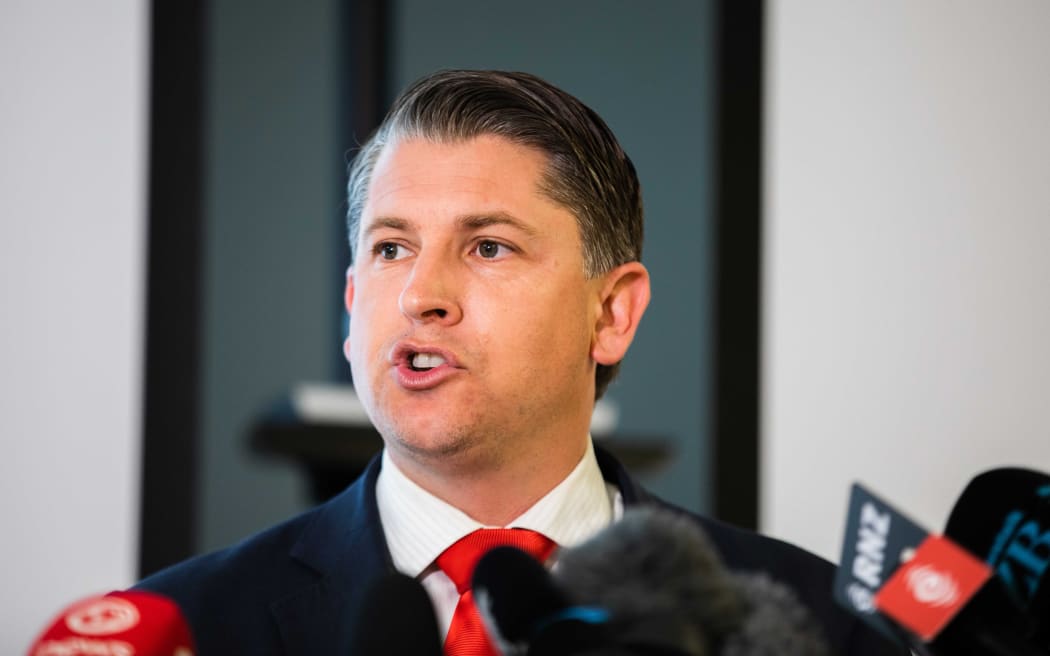
Transport Minister Michael Wood. Photo: RNZ / Dan Cook
"Overall, transport investment today is at record levels. However, there are always more possible projects than it is possible to fund," he said.
The "record high" of $21 billion is bolstered by $7 billion of Covid-19 rescue money focused on a few select transport projects, mostly in Auckland and Wellington, though including a new stretch of state highway south of Katikati.
The South Island councils are suffering from FOMO - fear of missing out - as they, mostly, are forced to compete for the regular fund away from the Covid billions.
"Certainly looking at North Island roads, they do look in a better state generally than ours," Tasman deputy mayor Stuart Bryant said. He chairs the South's overarching regional transport committee.
"This is more frustration coming to us from NZTA.
"Obviously, they're not getting the funding from government, or haven't been," Bryant said.
"No one really wants more of the same. Everyone's got projects that they've been waiting some time for now."
In the national transport programme for the last three years 2018-21, project targets were regularly missed, with, ironically, budgets regularly underspent, sometimes because a road-builder could not be found.
Nelson is caught in a stop-start dance trying to sort out its nightmare of tangled roads around the port.
"We're getting a bit tired of our issues always being the can that gets kicked down the road," Mayor Rachel Reese said.
"We have a very narrow State Highway route around our waterfront that carries the bulk of heavy transport to the port and from the port.
"It's a dangerous place to cycle and walk. It's an incredibly unpleasant place to do that."
They had done a decade of planning with NZTA but the agency has advised the project, including a Rocks Rd walking and cycling path, is running significantly behind time.
"We need to move to the next stage," Reese said.
"We've been saying to our public... 'Yes, we can get the plans, but there needs to be some money to deliver those plans'.
"My concern is that that waterfront project may get pushed out."
Reese is calling on the government to put more money for roads in the Budget next month.
"Our local road network is actually carrying much of the load of the state highway because it's so compromised.
"What we want is for Waka Kotahi to make a sound investment in their network."
Councils have until June to submit their plans, with NZTA telling them it was "critical" they sharpen their pencils.
However, at the same time, the agency told RNZ that, on average, signs were that councils were asking for a fifth more money than they got in the last three-year period, with some asking for up to 70 percent more.
Crosby said communication about the state of NZTA's finances had been patchy.
But the agency told RNZ it had been "advising for over a year that there are significant funding constraints for the 2021-24 National Land Transport Programme".
Waka Kotahi is aiming to increase total transport investment 15 percent, including the $7 billion of Covid-19 projects.
It has been looking for months for new sources of revenue, with help from the Transport Ministry and Treasury.
Crosby of LGNZ said the funding mechanism was fundamentally broken, for instance, relying on taxes on fossil fuels, when motorists are being told to go electric.
"We're still today hearing from mayors up and down the country, who are absolutely frustrated with the whole national transport funding system."
How priorities were set was a problem, as was just finding contractors, Crosby said.
Road funding was prone to political influence, too, he added.
"It's a confusing system."
The national system would insist on rigourous criteria, then "suddenly a handout will arrive" with different thresholds.
"This has been going on for 20 years by various governments, and many of them are political [decisions] ... you have two sets of criteria operating at the same time.
"It needs to be sorted and sorted quickly."
However, the signals about the funding mechanism of NZTA are confused.
Waka Kotahi said it had almost completed a review ordered by the former Transport Minister Phil Twyford, who said in 2019 it must find a new model.
The agency in its statement to RNZ gave nothing away, such as whether motorists might see fees and charges rise.
But Minister Wood, his portfolio buffered by the government's unexpectedly healthy revenues despite Covid-19, said his advice was the current funding model "is largely fit for purpose until at least the end of this decade based on forecasts".
"Officials will continue to monitor revenue and expenditure levels and consider what, if any, system changes are required," he said.
Rachel Reese, though, said she had a message for the NZTA board and minister.
"Really, is this region of any interest or priority to the government?"

